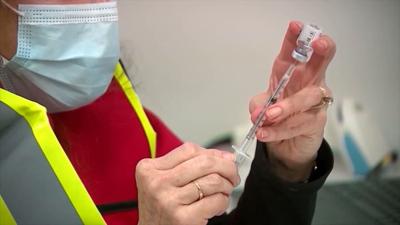LOUISVILLE, Ky. (WDRB) -- The spike in the omicron variant appears to be easing in Louisville.
In a news conference Tuesday, health officials said COVID-19 cases decreased last week in the metro area.
The city had 5,800 new cases last week compared to 16,000 at the height of the omicron wave. Dr. Sarahbeth Hartlage, associate medical director with the Louisville health department, said hospitalizations are also down dramatically over the last month.
"We've had an incredible number of cases over the last several weeks — couple months — in the omicron surge," she said. "And thankfully, only a small percentage of those folks needed hospitalization, and a very small percentage passed away."
But Hartlage also warned that the pandemic isn't over, saying that, "we still have 59 families this week who are mourning that loss, so it's just another reminder that the virus is still here and impacting people every day."
Louisville's reported case count of 5,814 is the seventh-highest weekly total since the start of the pandemic in March 2020. The city surpassed 4,000 or more cases just once prior to 2022 but has now reported seven consecutive weeks of 5,800 or more cases.
About 64% of Louisville residents have completed the vaccine series, and almost half of those have received a booster dose.
Louisville #COVID19 Data Metrics pic.twitter.com/P4SeMmffsa
— LouMetroHealth (@LouMetroHealth) February 15, 2022
Health officials are still seeing patients with long-term effects from COVID-19. Doctors said long-haul symptoms can include headaches, depression, overall weakness, shortness of breath, prolonged cough, loss of taste or smell, ringing in the ears, brain fog, nausea, loss of appetite, high blood pressure, low blood pressure, skin issues like hives and rashes, and hair loss.
"Some doctors don't even really know about the symptoms, and they're like, 'Oh, you're fine, you're fine,' and they dismiss it," Dr. Christian Furman, medical director with UofL Health Trager Institute, said in a news release. "And that's what really is so hard for the patient because it's like, 'No, it's real.' They really do have these issues."
Demetrius Booker, who spent nearly 100 days in the hospital with COVID-19 in 2020, is still struggling with long-term effects from the virus. He returned to the hospital multiple times in 2021 with complications related to the illness.
"Breathing is still difficult at times because of the damage COVID did to my lungs," Booker said.
The UofL Health Trager Institute opened a clinic for patients dealing with COVID-19 long-haul symptoms in Oct. 2020. The clinic also offers behavioral health therapists who can refer to counseling.
Norton Infectious Diseases Institute also established long-term COVID-19 care clinics in September 2020.
Norton long-term #COVID19 care clinics: https://t.co/Wyg4mUYswm pic.twitter.com/7Tdnb3JfTm
— LouMetroHealth (@LouMetroHealth) February 15, 2022
Dr. Joseph Flynn, chief administrator for Norton Medical Group, said long-haul COVID-19 is a profound trauma.
"We've seen everything from people who were marathoners who can't blow out birthday candles to people who were students and high functioning, and they have overarching brain fog, headaches, fatigue," Flynn said.
Copyright 2022 WDRB Media. All Rights Reserved.











